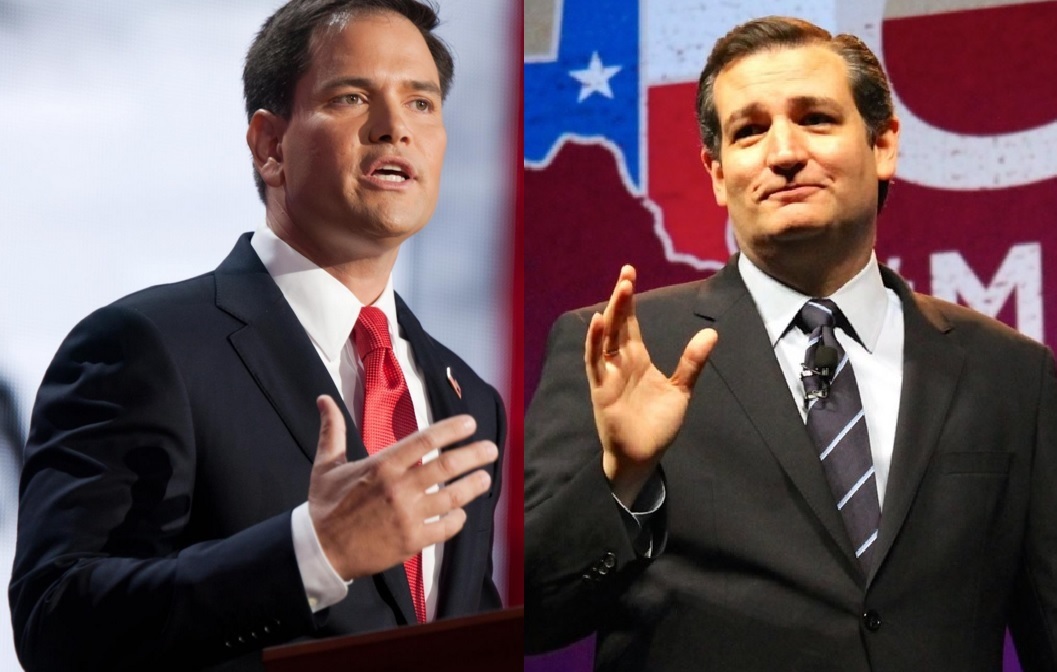News
Debate night: Insults flying once more despite pledges

Marco Rubio (left) and Ted Cruz (right) pressed Trump aggressively on his conservative credentials, his business practices and changing policies.
(Facebook photos)
DETROIT—Marco Rubio and Ted Cruz levelled withering criticism at Donald Trump’s “flexible” policy positions and personal ethics in a Republican presidential debate Thursday in an attempt to derail the brash billionaire’s growing lead in the primaries.
The two senators pressed Trump aggressively on his conservative credentials, his business practices and changing policies.
Earlier in the day, in an extraordinary display of Republican chaos, the party’s most recent presidential nominees, Mitt Romney and John McCain, lambasted Trump on Thursday, calling him unfit for office and a danger for the nation.
“His is not the temperament of a stable, thoughtful leader,” Romney declared. He called Trump “a phoney” who is “playing the American public for suckers,” a man whose “imagination must not be married to real power.”
The vicious feud marked a near-unprecedented scenario pitting the Republican Party’s most prominent leaders, past and present, against each other as Democrats begin to unite around Hillary Clinton.
The criticism set the tone for a primetime debate in which Trump lashed back, calling Romney “a failed candidate” who lost to Barack Obama four years ago because he was such a poor candidate. The loss, Trump charged, was “an embarrassment.”
But on a day when the Republican establishment was in chaos over the prospect of Trump landing the party’s nomination, Cruz, Rubio and Ohio Gov. John Kasich all said they would support Trump if he won primary election battle. And Trump, in turn, said he would support whoever wins—though he seemed to find it inconceivable that it might not be him.
Pressed on policy matters, Trump, in short order, signalled a willingness to deal on any number of issues.
He said it was fine that Florida Sen. Rubio had negotiated with other lawmakers on immigration policy.
He said he had changed his own mind to support admitting more highly skilled workers from overseas, adding matter-of-factly, “I’m changing. I’m changing. We need highly skilled people in this country.”
And he also was matter of fact about providing campaign contributions to leading Democrats, including 10 checks to Hillary Clinton, reviled by many conservatives.
Trump said it was simply business.
“I’ve supported Democrats and I’ve supported Republicans, and as a businessman I owed that to my company, to my family, to my workers, to everybody to get along,” he said.
The bad blood among the candidates flowed freely.
Rubio justified his attacks on Trump by saying the billionaire businessman had “basically mocked everybody” over the past year.
Trump then noted that Rubio had mocked his hands as small, widely viewed as an insult about Trump’s sexual prowess. Holding his hands up to the audience, Trump declared, “I guarantee you, there’s no problem” in that area.
It was a jaw-dropping moment in a campaign that’s been full of surprises from the beginning.
On policy, when moderator Megyn Kelly told Trump his shifts caused some people to question his core, Trump insisted: “I have a very strong core. I have a very strong core. But I’ve never seen a successful person who wasn’t flexible, who didn’t have a certain degree of flexibility.”
Kasich sought to turn Trump’s statement on the value of “flexibility” into a character question. When meeting with voters, the Ohio governor said, “you know what they really want to know? If somebody tells them something, can they believe it?”
In one moment of levity, Texas Sen. Cruz poked fun at Trump for interrupting, telling the businessman, “Breathe, breathe, breathe.”
Rubio chimed in, “When they’re done with the yoga, can I answer a question?”
In another exchange, Rubio faulted Trump’s businesses for manufacturing clothing in China and Mexico rather than the U.S. Asked when he would start making more clothes in the U.S., Trump said that would happen when currency valuations weren’t biased against manufacturing garments in America.
Cruz, too, took the fight to Trump, accusing him of being “someone who has used government power for private gain.
”
“For 40 years, Donald has been part of the corruption in Washington” that people are angry about, Cruz said, citing Trump’s campaign contributions to leading Democrats, including then-Sen. Clinton.
With Ben Carson’s exit from the race this week, the field of Republican candidates has now been narrowed to four, but any number of predictions that GOP voters would unite behind one anti-Trump candidate have come and gone without a change in the overall dynamic.
Trump, with 10 state victories, leads the field with 329 delegates. Cruz has 231, Rubio 110 and Kasich 25. It takes 1,237 delegates to win the Republican nomination for president.





















